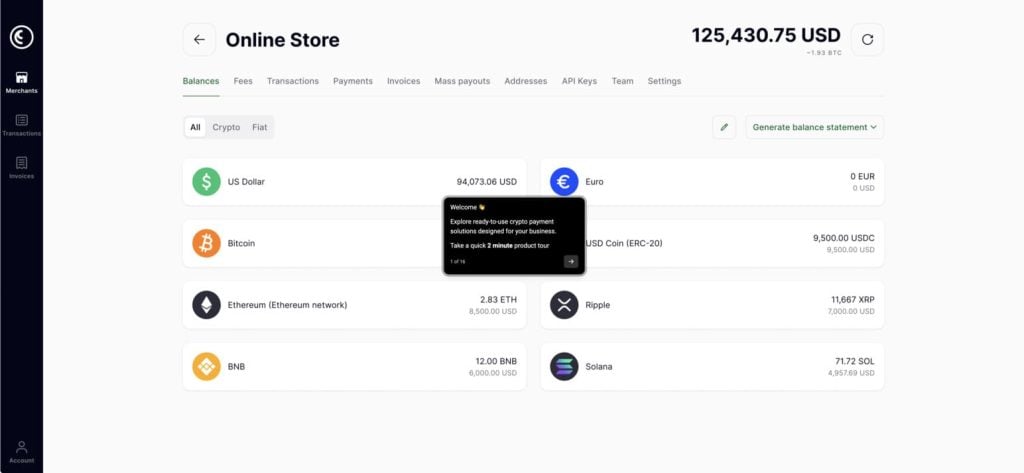What is a Crypto Exchange?
A crypto exchange is a digital platform that allows you to buy and sell various cryptocurrencies.
Table of Contents:
A crypto exchange acts as an intermediary that connects buyers and sellers or a marketplace where users can trade cryptocurrencies for other digital assets or traditional fiat currencies. These platforms play a crucial role in the broader cryptocurrency ecosystem by providing liquidity and price discovery for a wide range of digital assets.
Crypto exchanges can vary in terms of the cryptocurrencies they support, trading features, and security measures. Users typically create accounts on these platforms, deposit funds via a crypto payment gateway or P2P, and execute trades based on the current market prices. The exchange acts as a custodian of users’ funds during trading activities.
Types of Crypto Exchanges
1. Centralized Exchange
Centralized exchanges, or CEX, are traditional platforms where buyers and sellers trade through an intermediary, which is the exchange itself. These platforms are operated by centralized entities and act as trusted third parties that facilitate transactions. Examples include Binance, Kraken, and many others.
CEX offers high liquidity, making it attractive to traders seeking swift and efficient transactions. They usually provide user-friendly interfaces, making them accessible to beginners. Additionally, centralized exchanges often feature a large choice of cryptocurrencies, giving users the option to trade a wide variety of digital assets.
However, centralized exchanges come with their own challenges. Users have to rely on the exchange to keep their funds safe and secure, which creates a risk if the platform is compromised. Decisions, such as listing new tokens or implementing changes, are controlled by a central authority, reducing the decentralized nature inherent in cryptocurrencies.
2. Decentralized Exchange
Decentralized exchange (DEX) operates without a central authority. They facilitate peer-to-peer trading directly from users’ wallets using smart contracts. Good examples would be PancakeSwap, Uniswap, and SushiSwap.
DEXs aim to reduce custodial risk by allowing users to retain control over their funds. They enhance privacy, as DEX platforms often require minimal user information. Additionally, their decentralized nature makes them more resilient to large-scale hacks.
The downside of DEX is that they may have lower liquidity compared to centralized counterparts, making them less suitable for large trades. The user interfaces of some DEX platforms might be less user-friendly for beginners, and these platforms may not support as many cryptocurrencies as centralized exchanges.
Factors to Consider When Choosing a Crypto Exchange
When choosing a cryptocurrency exchange, users should consider several aspects to ensure safe and suitable trading:
- Security
Assess the platform’s security measures, including two-factor authentication and insurance against hacks. - Liquidity
Choose an exchange with sufficient liquidity to ensure that buying or selling large amounts of cryptocurrency can be done without significant price slippage. - Fees
Different exchanges have varying fee structures. Take trading fees, withdrawal fees, and any other associated costs into account. - Supported Cryptocurrencies
Make sure the exchange supports the particular cryptocurrencies you want to trade. - User Interface
Evaluate the user interface for ease of use, especially if you are a beginner. Some users may prefer the simplicity of centralized exchanges, while others may appreciate the control offered by decentralized platforms. - Regulatory Compliance
Check if the exchange complies with relevant regulations in your jurisdiction to avoid legal issues. - Customer Support
Responsive and effective customer support service is a must for any crypto exchange.
Conclusion: why crypto exchanges are foundational to the digital asset economy
Crypto exchanges are central to how digital assets move and interact.
They can shape liquidity, influence pricing, and ensure trading remains functional.
Centralized and decentralized platforms operate differently, but both provide essential infrastructure.
What to know before using a crypto exchange:
- Exchanges determine how assets can be bought, sold, or transferred.
- They give insight into market conditions and price trends.
- Reliable platforms can support stability and transparency in the digital asset ecosystem under certain conditions.
Exchanges support the movement of digital assets across different networks and platforms.
Other Terms from the Crypto Industry
